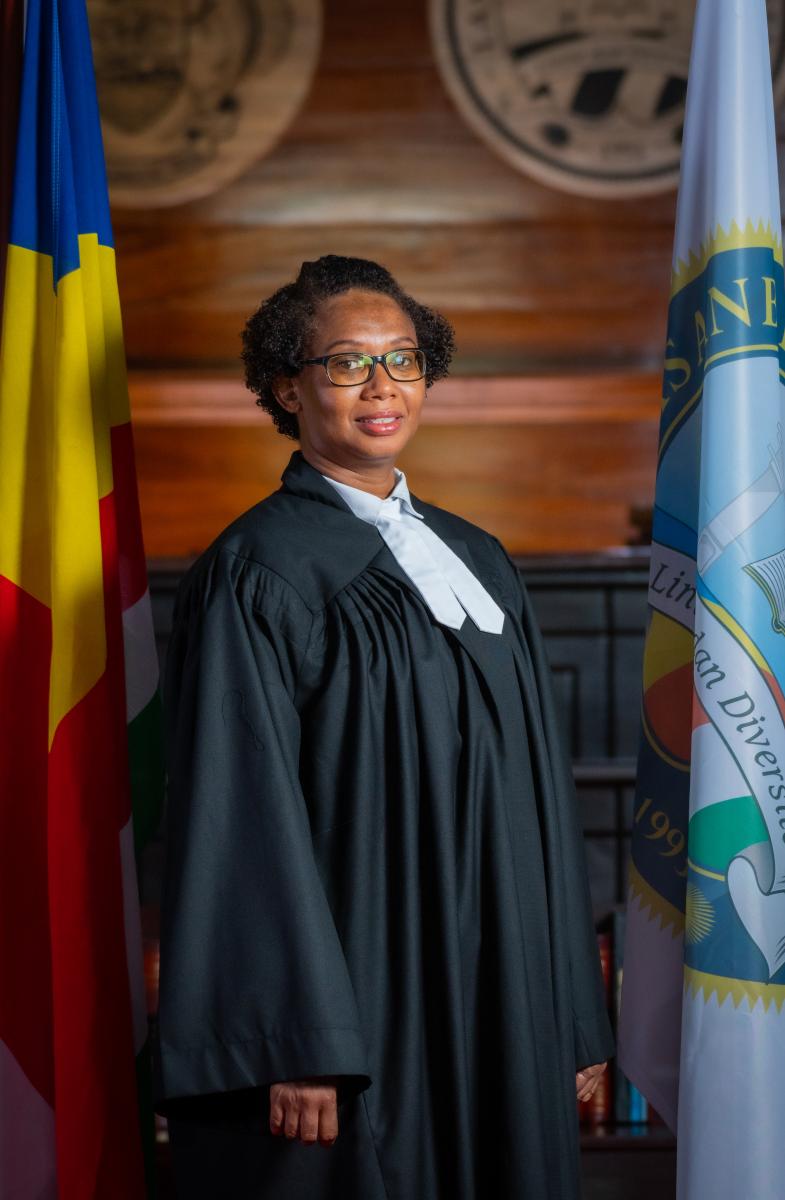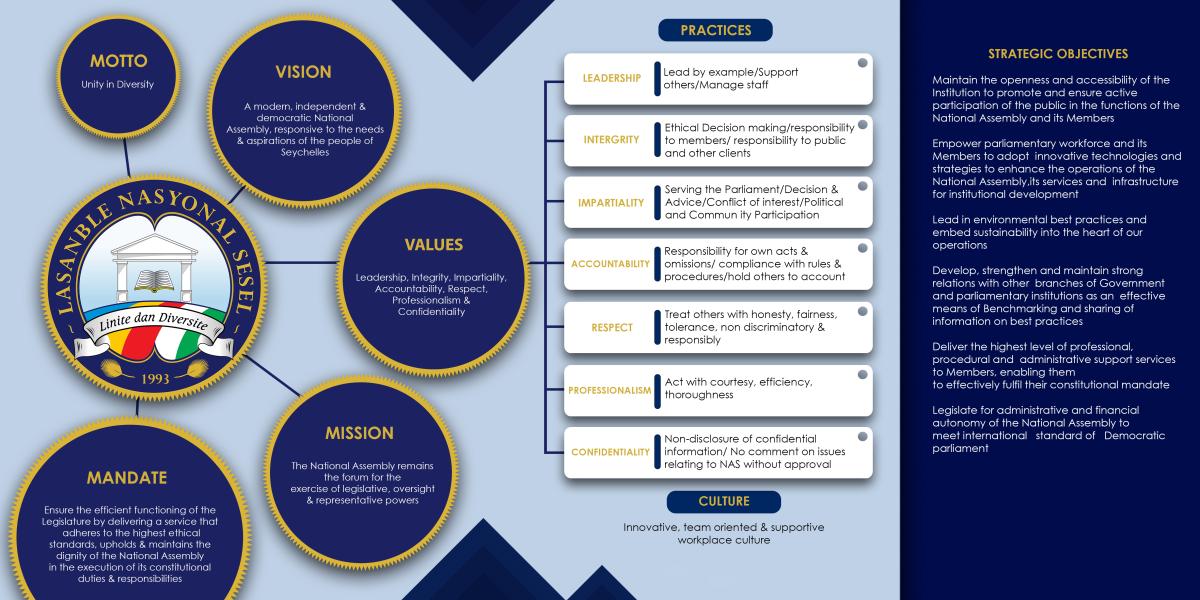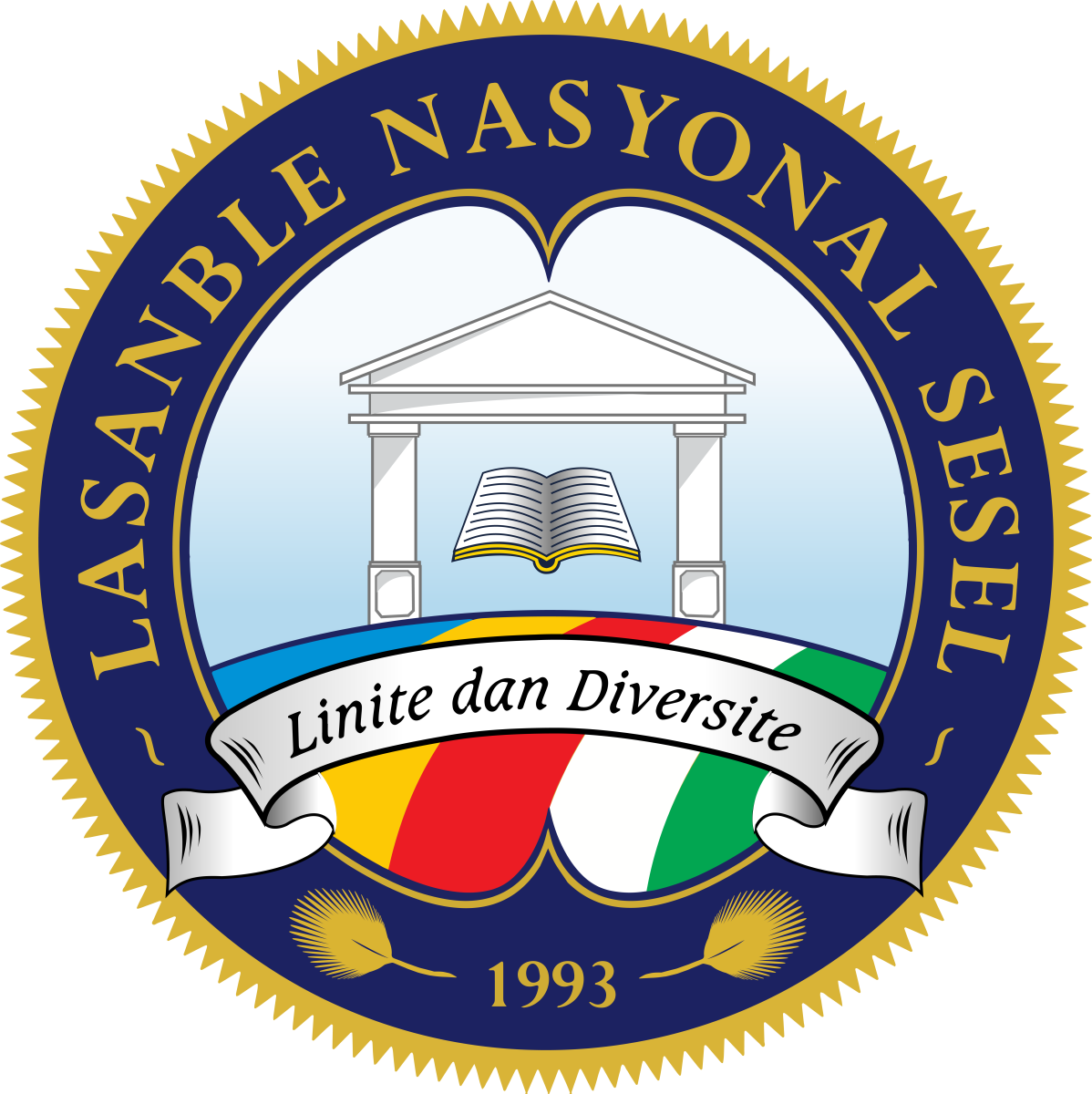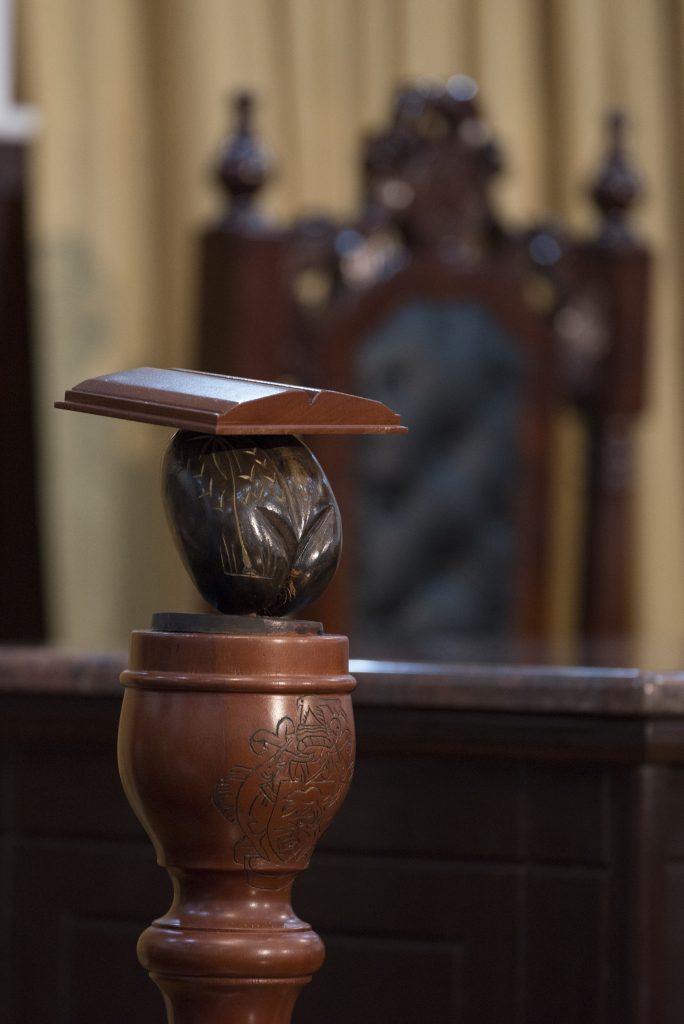The Speaker is the head of the Legislative branch of Government and is the Presiding Officer of the National Assembly.
The Clerk to the National Assembly is the Chief Executive and Accounting Officer of the National Assembly Service and the Deputy Clerk is the Deputy Chief Executive Officer. The Clerk serves as the principal adviser on parliamentary procedures and practices assisted by the Deputy Clerk. In addition, the Clerk, assisted by the Deputy Clerk guides and directs all departments within the National Assembly Service to provide specialist advice in relation to the House’s proceedings and parliamentary support services.

Mrs. Tania Isaac

Ms. Alexandria Faure
The National Assembly Service is the impartial administrative body headed by the Clerk, who is assisted by a Deputy Clerk. The National Assembly Service provides necessary parliamentary services to allow the Assembly to function properly and efficiently in all matters connected with its procedures and parliamentary practices. The National Assembly Service also organizes the Assembly’s Business and proceedings, and the works undertaken by its Committees and other international Parliamentary Associations.
-
Office of the Clerk & Deputy Clerk
-
The Clerk (CEO) is the head of the National Assembly Service and Accounting Officer of the Legislature. The Clerk is assisted by a Deputy Clerk (Deputy CEO). The Office of the Clerk is equivalent to the office of the Principal Secretary in the Executive.
The Clerk of Parliament reports to the Speaker of the National Assembly. In the absence of the Clerk, these duties are delegated to the Office of the Deputy Clerk. The National Assembly Service of the Office of the Clerk is composed of a Parliamentary Secretary and a Senior Private Secretary. Other portfolios directly responsible to the Clerk include the Security Unit and the Human Resources Unit.
The portfolio directly responsible to the Office of the Deputy Clerk includes the Public Relations & Protocol Office.
The main duties of the Clerk are broadly procedural and administrative as guided by the Standing Orders and the Constitution as followed:
- Manages the Business of the House by preparing the Order Paper, processing bills and other Assembly papers before the House.
- Responsible for the recording and official reporting of proceedings of the House and its Committees.
- Authenticate bills passed by the National Assembly before presentation to the President for assent.
- Officiate the Oath of Allegiance taken by the Speaker, Deputy Speaker and other Members of the National Assembly.
- Provide administrative support services to the Office of the Speaker, Leaders and other Members.
- Lead and manage staff of the National Assembly Service through the Management Committee.
- Responsible for ensuring quality control and standards, by constant review of systems and procedure to efficiently deliver parliamentary support services.
- Responsible for the Management of all human, material and financial resources of Parliament as the Accounting Officer of the Institution.
- Promote innovative ways of engaging the public in the work of Parliament.
- Represent the National Assembly of Seychelles at relevant national, regional and international forums.
To Contact the office of the Clerk for official purposes please email - clerk@nationalassembly.sc or deputyclerk@nationalassembly.sc
-
Human Resources
-
The Human Resources Unit aims to attract, develop and retain a high performing, inclusive and diverse workforce and foster a healthy, safe, well-equipped and productive work environment for all staff, in order to make best use of individual potential, develop the Institution’s capacity and, position the National Assembly of Seychelles as a competitive Employer-of-choice.
To date, our workforce consists of 45 staff, 13 Male and 32 Female who fill technical, administrative and managerial roles within the National Assembly Service. Proudly, our labour force is made up of 100% Seychellois.
There is however still much to do to support staff to ensure they have the right environment and attitude to continue to deliver to high standards. We are working to ensure that staff feel continuously motivated by their time spent at work, they feel fulfilled, professionally managed and supported to achieve their goals, both professionally and personally.
To contact Human Resources email us on hr@nationalassembly.sc
-
Sergeant-at-Arms & Security
-
The Security Unit is headed by the Sergeant-at-Arms and is responsible for the coordination and provision of security for the whole precinct, visitor facilitation and screening, as well as chamber support.
The Sergeant-at-Arms is assisted by an Assistant Sergeant At Arms. The Sergeant-at-Arms is the Custodian of the “Mace”, which symbolises the authority of the Speaker and inside the House he is the officer who carries out the Orders given by the Speaker. The Sergeant-at-Arms also escorts the Speaker of the National Assembly into and out of the Chamber, while carrying the Mace.
He is empowered to ensure security in the Chamber and execute the Orders given by the Speaker to suspend a Member of Parliament temporarily or to remove the relevant Member from the Chamber for disobeying or disregarding the Standing Orders/Authority of the Speaker.
In the performance of his duties, the Sergeant-at-Arms occupies a special place in the Chamber next to the main door.
Security
- Provide a safe and secure environment and infrastructure throughout the Parliament by ensuring that the risk from violence, accident and fire for those who work in and visit the Parliament is managed and minimized.
- Maintain the physical security of the Parliament and its precincts effectively and efficiently and provide useful advice on protective security for the Members, Staff and Visitors within the Parliamentary Precincts.
- Maintain order within the Precincts of Parliament.
- Ensure that appropriate security checks are undertaken for the granting of security clearance.
To contact the Sergeant-at-Arms and Security Team please email us on security@nationalassembly.sc
-
The Hansard
-
The Hansard Unit listens carefully to every word that is being said by the Members and transcribes them into a document called the ‘Verbatim’. The Unit comprises of Hansard Reporters and Editors.
Every word that is said in the Chamber is recorded by this dedicated team of reporters and published on our website. All these records are saved digitally in our online archives.
Additionally, the 3 key roles of the Parliamentary Reporters Unit is:
- To serve in Chamber during Sittings
- To transcribe Verbatim accurately (turn in from audio to written form)
- To make Verbatim readily accessible to National Assembly Service Staff and Members on request
To contact the Hansard Unit kindly email us on verbatim@nationalassembly.sc
-
Public Relations and Protocol Office
-
Public Relations
The Public Relations department upholds the image of the National Assembly, communicates regularly with Media Houses and manages the website and social media platforms of the institution.
The department is responsible for preparing publicity materials, promotional audio and videos, as well as educational materials to inform the general public on the different activities of the National Assembly. Additionally, the department is also responsible for conceptualizing, coordinating and developing the National Assembly's Strategy in the field of public relations and is responsible for editing and maintaining institutional branding and information.
The Public Relations department raises awareness of the work, processes and relevance of the institution of Parliament. Through the organisation of outreach activities with schools and other institutions we aim to strengthen the connection between Parliament and the public.
Protocol
The National Assembly’s Protocol Team includes several capable National Assembly Service Staff who have been selected and they assist with visiting Delegations, Ambassadors, and the arrival of Ministers during Sittings, Committee Public Hearings and Meetings whereby VIPs are to be in attendance.
The team uphold protocol measures for events by maintaining sitting arrangements, the Order of Precedence, arrangement of gifts, as well as host the VIP. For international delegations visiting Seychelles, the Office spearheads the organisation of the programme.
For any press queries kindly contact us on press@nationalassembly.sc
For any Protocol related matters kindly email us on protocol@nationalassembly.sc
-
Media Operations
-
The Media & Operations Unit of the National Assembly manage the filming and live streaming of the Sittings in the Chamber. Officers in this unit operate the cameras, other video and photography devices to capture, record, broadcast and archive meetings and events, particularly the Live Sittings.
They work closely with the Public Relations office to devise and produce promotional media campaigns in order to sensitize the people about the work of the National Assembly, including coordinating the creation of documentaries and programmes.
When preparing for the live filming of the National Assembly Sittings, the Media Operations Unit determines precise sound levels for recording, appropriate to the visual image and ensures that the quality of recorded sound and light is to the required standard for live broadcasting on television.
To contact Media Operations kindly email us on media@nationalassembly.sc
-
Corporate Services & Facilities
-
The main functions under the purview of the Director for Corporate Services & Facilities are to have oversight of the administration, infrastructure and logistical services within the National Assembly in line with national and internal regulations, policies and procedures.
Administration, Maintenance & Housekeeping
The Administration Unit is tasked to provide effective support services to all units, for the smooth running of the National Assembly Service and the National Assembly. This entails managing Housekeeping, the maintenance of the Building and Grounds, Transportation and Fleet Management, Reception and Telephone Services. Additionally, the officers of the Unit manage the Procurement of goods for the National Assembly, Purchasing and Stores Management, Catering Services and Contract Administration for Outsourced Services.
To contact the Administration Unit kindly email us on admin@nationalassembly.sc
Accounts
The duties and responsibilities of the officers in this unit are to provide a comprehensive range of financial services and ensure that the funds allocated in the budget of the National Assembly is effectively managed and reported. The Accounts Unit is tasked with preparing, examining and analysing the institution’s accounts, financial records and other financial obligations to ensure compliance with financial reporting and other standard procedures.
To contact the Accounts Unit kindly email us on finance@nationalassembly.sc
-
Information, Communications & Technology
-
The Parliamentary Information, Communications and Technology Unit is responsible for the architecture, hardware, software and networking of computers in the National Assembly. An ICT staff performs a number of duties to ensure that employees have adequate access to the computer systems. The unit focuses primarily on technical support although there are other areas of IT such as programming that are necessary to ensure complete overall administration of the IT system. IT hosts various in-house services to assist both staff and Members of the National Assembly access to important documents, emails, media, etc.
Technical Support
IT provides support to staff and members of the National Assembly. This can include installing new software, repairing hardware problems, installing new hardware, troubleshooting problems and training employees how to use new software programs.
Administration
IT is also responsible for installing and setting up the computer network and servers; ensures that the network is operating properly and that all employees have the ability to communicate through the Internet and Intranet; and also, is responsible to keep the system secure and troubleshoot the system in the event of a problem.
To contact the Parliamentary ICT Unit kindly email us on it@nationalassembly.sc
Accounts
The duties and responsibilities of the officers in this unit are to provide a comprehensive range of financial services and ensure that the funds allocated in the budget of the National Assembly is effectively managed and reported. The Accounts Unit is tasked with preparing, examining and analysing the institution’s accounts, financial records and other financial obligations to ensure compliance with financial reporting and other standard procedures.
To contact the Accounts Unit kindly email us on finance@nationalassembly.sc
-
The Information Centre
-
The Information Centre comprises three operational units:
- The Library
- The Archives
- The Museum
Our mission
The mission of the Information Centre is to contribute to Seychelles’ Parliamentary democracy by creating, managing and delivering authentic, accessible and relevant information and knowledge for the National Assembly.
The Library
The library of Parliament is a special library, which seeks to fulfil the information needs and requirements of Members of Parliament and Parliamentary staff by providing unbiased relevant facts, information and publications. The Library collection comprises a variety of formats including books, journals, legislations, videos, CD's, DVD’s, local and international reports, online databases and links to internet resources.
The Archives
We work to advance the capacity to preserve Parliament's resources for the benefit of present and future generations. Our ongoing work encompasses all of Parliament’s assets which require long-term preservation. This includes data, documents, records and other recorded information that has a specific value to Parliament.
The Museum
The Parliamentary museum, which is located on the upper and ground lobby of the National Assembly building, is called 'Evolution of the Seychelles Parliament' and comprises a collection of photographs, audios, videos, logos, maps and artifacts.
The museum tells the story of the Seychellois struggle for legislative representation, the fight for independence, the one-party era and the return of multi-party democracy.
"In a sense, the museum enables us to experience history, allowing us to travel through time and discover the milestones of our democracy;
To contact the Information Centre kindly email us on library@nationalassembly.sc
-
Parliamentary Research Services
-
A key role for parliamentarians around the world consists of developing, assessing and voting legislation. In addition, parliamentarians are expected to hold governments to account. They can also be called upon to scrutinize the activities of governments, in order to ensure that governments are implementing the decisions of a parliament. Their ability to perform these roles all along the policy and legislative cycle will be shaped by their access to authoritative and reliable information.
Parliamentarians need access to up-to-date and accurate information and research in order to effectively perform their parliamentary duties. All research produced by the parliamentary research unit shares key characteristics such as impartiality, accessibility and relevance.
The Research Unit performs the following:
- publicly-available briefings for all Parliamentarians on the impacts of proposed legislation, policies and programmes and other topical issues;
- the provision of a confidential question-answering service for individual Parliamentarians. Answers can be: over the telephone, face-to-face or written; very short; provided within tight deadlines; and are provided in confidence to the Parliamentarian;
- information services, such as the provision of expert resources e.g. academic papers or media articles.
To contact the Research Unit kindly email us on research@nationalassembly.sc
- Legal
-
The Legal Unit is responsible for handling all legal matters of the National Assembly and work with the Scrutiny of Bills Committee and any other Committee of the National Assembly to provide legal opinions, present legal implications and advice on the constitutionality of Bills, Resolutions, proposed amendment(s) to laws, and executive orders, and on the interpretation and application of the rules and other legislation.
For any legal queries email us on legal@nationalassembly.sc

Our Emblems and Symbols
Our Logo

The Motto
The official motto of the National Assembly is ‘Unity in Diversity’. In an institution like the National Assembly, the Parliament of the country; differences in opinions will always exist, but such differences should, rather than divide, unite us. It is simply through unity in diversity, that the institution will remain strong, and fulfil its constitutional role to ensure stability and prosperity for the country.
The Building & Pillars
The building is represented in the logo by the two pillars, which represents the two political forces in the country- the Government and the Opposition. Both political forces support the Seychellois nation, represented in our logo by the building’s crown.
The Constitution
In between the two pillars, is a book which represents the Constitution of the Republic of Seychelles; the supreme law of the land. The Constitution reminds us that as citizens of Seychelles and Members of the National Assembly, we must always respect the rule of law. It is the Members’ duty to defend and uphold the Constitution of the Republic.
The Colours of the National Flag
The colours of the National Flag of Seychelles are represented in the land on which the building stands.
The Coco-de-Mer
The Coco-de-Mer surrounds all the aforementioned elements, and represents a unique element of our islands. At the bottom we see two Coco-de-Mer Palm leaves, each facing in opposite directions. This illustrates that in nature, it is only when we have two opposing forces; positive and negative; that a balance is maintained.
The Third Republic & the Archipelago
1993, is the year in which the Third Republic came into being and thus the National Assembly was created. The Seychelles is an archipelago of 155 islands, illustrated by the 155 spikes surrounding the logo.
The National Assembly Mace

The Mace is the Symbol of the Speakers’ authority and impartiality. It is carried into the Chamber by the Sergeant at Arms, who is the custodian of the Mace.
In the National Assembly of Seychelles the Mace is placed upright in a special wooden stand on the Speakers’ own right. By Convention, the Assembly cannot proceed unless the Mace is present in the Chamber. The National Assembly Mace is made of ‘Bwa Nwar’ and at the top of the Mace is an open book which represents the Constitution of Seychelles with the Preamble engraved on it. The open book rests on a Coco De Mer which in turn rests on a drum like wooden bust with the crest of Seychelles engraved on the front. The Mace of the National Assembly was designed and built by Mr. Colin Dyer, a former Member.
